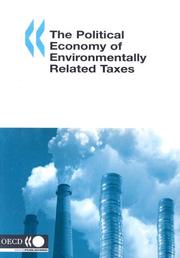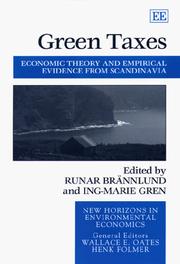| Listing 1 - 10 of 68 | << page >> |
Sort by
|

ISBN: 9041100687 Year: 1995 Publisher: Dordrecht : Kluwer,
Abstract | Keywords | Export | Availability | Bookmark
 Loading...
Loading...Choose an application
- Reference Manager
- EndNote
- RefWorks (Direct export to RefWorks)
Environmental impact charges --- -Eco-taxes --- Ecological taxes --- Ecotaxes --- Effluent charges --- Environmental exploitation charges --- Environmental impact fees --- Environmental taxes --- Green taxes --- Pollution charges --- User charges --- Congresses --- Congresses. --- -Congresses
Book
ISBN: 9811630372 9811630364 9789811630378 Year: 2021 Publisher: Gateway East, Singapore : Springer,
Abstract | Keywords | Export | Availability | Bookmark
 Loading...
Loading...Choose an application
- Reference Manager
- EndNote
- RefWorks (Direct export to RefWorks)
This volume analyses the process and structure of ecotaxes in India to bring forth its rationale, application and incidence on emerging environmental problems on the backdrop of the environmental issues confronted by the Indian economy. Being at infant stage in India, the concept of ecotaxes is plagued with large empirical difficulties. This book provides a holistic understanding of the complexities in the design and implementation of these fiscal instruments at the country level. After elaborating on the theory, history of its applications, the book provides an innovative methodological exercise. It examines the adequacy and relevance of ecotaxation in the Indian context, along with ensuring that the distortions due to the proposed levy are minimised. The incidence of these taxes on the households, the double dividend hypothesis and the effect on competitiveness of the producer are a few of the core themes elaborated upon in this book. This is demonstrated through a linear general equilibrium framework of Environmentally extended Social Accounting Matrix (E-SAM). The book provides material for the researchers and graduate students on the methodological structure of eco-taxes. The proposed methodological intervention could be utilised by the researchers who wish to analyse the macroeconomic impact of any tax through the framework of Social Accounting Matrix (SAM). Additionally, the process as well as the implications and nuances provided in the book will assist the policy makers to design innovative policies for dealing with environmental issues. The volume also has something for the practitioners by helping them comprehend various effects of these instruments on different stake holders of the economy and thus will be useful as a policy prescription. The three policy scenarios analysed in this study could be considered by the policymakers while attempting to design these instruments in the Indian context and thus ending the extensive reliance on the age old and grossly ineffective Command and Control (CAC) Policies
Environmental impact charge. --- Environmental impact charges --- Eco-taxes --- Ecological taxes --- Ecotaxes --- Effluent charges --- Environmental exploitation charges --- Environmental impact fees --- Environmental taxes --- Green taxes --- Pollution charges --- User charges
Multi
ISBN: 9026831137 9789026831133 Year: 1997 Volume: 49 Publisher: Deventer Kluwer
Abstract | Keywords | Export | Availability | Bookmark
 Loading...
Loading...Choose an application
- Reference Manager
- EndNote
- RefWorks (Direct export to RefWorks)
Environmental impact charges --- Law and legislation --- -Eco-taxes --- Ecological taxes --- Ecotaxes --- Effluent charges --- Environmental exploitation charges --- Environmental impact fees --- Environmental taxes --- Green taxes --- Pollution charges --- User charges --- Theses --- -Law and legislation --- Eco-taxes --- Environmental impact charges - Law and legislation

ISBN: 1280607122 9786610607129 9264025537 9264025529 Year: 2006 Publisher: Paris OECD
Abstract | Keywords | Export | Availability | Bookmark
 Loading...
Loading...Choose an application
- Reference Manager
- EndNote
- RefWorks (Direct export to RefWorks)
Based on experience in OECD countries, this book provides a comprehensive discussion of the effectiveness of environmentally related taxes, of recent research on the environmental and economic impacts of applying them, an on their potential for wider use. In particular, it looks at how to overcome obstacles to their implementation. It also discusses the environmental and economic effects of combining such taxes with other instruments for environmetal policy.
Environmental impact charges. --- Environmental impact charges --- Economic aspects. --- Eco-taxes --- Ecological taxes --- Ecotaxes --- Effluent charges --- Environmental exploitation charges --- Environmental impact fees --- Environmental taxes --- Green taxes --- Pollution charges --- User charges --- Economic aspects

ISBN: 0792336569 9048146003 940158642X Year: 1995 Volume: 4 Publisher: Boston ; Dordrecht ; London Kluwer Academic Pub.
Abstract | Keywords | Export | Availability | Bookmark
 Loading...
Loading...Choose an application
- Reference Manager
- EndNote
- RefWorks (Direct export to RefWorks)
Eco-taxes --- Ecological taxes --- Ecotaksen --- Effluent charges --- Ekotaksen --- Environmental exploitation charges --- Environmental impact charges --- Environmental impact fees --- Environmental taxes --- Fiscalité écologique --- Impôt écologique --- Malus écologiques --- Milieubelastingen --- Pollution charges --- Pollution--Impôts --- Redevances environnementales --- TGAP --- Taxe d'environnement --- Taxe générale sur les activités polluantes --- Taxe verte --- Taxe écologique --- Taxes environnementales --- Taxes sur la pollution --- Taxes écologiques --- Écotaxes --- Environmental impact charges. --- Environmental policy --- Economic aspects. --- Economic aspects

ISBN: 1853832626 Year: 1997 Publisher: London Earthscan
Abstract | Keywords | Export | Availability | Bookmark
 Loading...
Loading...Choose an application
- Reference Manager
- EndNote
- RefWorks (Direct export to RefWorks)
Eco-taxes --- Ecological taxes --- Ecotaksen --- Effluent charges --- Ekotaksen --- Environmental exploitation charges --- Environmental impact charges --- Environmental impact fees --- Environmental taxes --- Fiscalité écologique --- Impôt écologique --- Malus écologiques --- Milieubelastingen --- Pollution charges --- Pollution--Impôts --- Redevances environnementales --- TGAP --- Taxe d'environnement --- Taxe générale sur les activités polluantes --- Taxe verte --- Taxe écologique --- Taxes environnementales --- Taxes sur la pollution --- Taxes écologiques --- Écotaxes
Book
ISBN: 1282103067 9786612103063 9264059490 9264050337 Year: 2009 Publisher: Paris : OECD,
Abstract | Keywords | Export | Availability | Bookmark
 Loading...
Loading...Choose an application
- Reference Manager
- EndNote
- RefWorks (Direct export to RefWorks)
Water is a key prerequisite for human and economic development, and for maintaining ecosystems. However, billions of people lack access to water and sanitation services, mainly due to poor governance and inadequate investment and maintenance. This report, which emphasises the economic and financial aspects of water resources management and water service provision, the need for an integrated approach (including governance considerations) to address these complex policy challenges, and the importance of establishing a firm evidence base to support policy development and implementation, summarises the results of OECD work in this area.
Water resources development. --- Water resources development --Economic aspects. --- Water-supply. --- Water-supply --Management. --- Water resources development --- Water-supply --- Business & Economics --- Agricultural Economics --- Economic aspects --- Management --- Water quality management --- Environmental impact charges --- Finance. --- Eco-taxes --- Ecological taxes --- Ecotaxes --- Effluent charges --- Environmental exploitation charges --- Environmental impact fees --- Environmental taxes --- Green taxes --- Pollution charges --- Water quality --- Water quality control --- User charges --- Sewage disposal --- Water conservation
Book
ISBN: 9264162607 9264160787 Year: 1998 Publisher: Paris : OECD Publishing,
Abstract | Keywords | Export | Availability | Bookmark
 Loading...
Loading...Choose an application
- Reference Manager
- EndNote
- RefWorks (Direct export to RefWorks)
This report examines the progress made in water management in OECD countries in the light of the objectives of Agenda 21. It presents the experience of the OECD programme of environmental performance reviews and focuses on issues of sustainable use of water resources, pollution control and water economics. Environmental performance reviews of Australia, Austria, Belarus, Bulgaria, Canada, Finland, France, Germany, Iceland, Italy, Japan, Korea, Mexico, the Netherlands, New Zealand, Norway, Poland, Portugal, Spain, Sweden, the United Kingdom and the United States have already been published.
Environment --- Water quality management --- Environmental impact charges --- Business & Economics --- Economic History --- Finance --- Statistics --- Eco-taxes --- Ecological taxes --- Ecotaxes --- Effluent charges --- Environmental exploitation charges --- Environmental impact fees --- Environmental taxes --- Green taxes --- Pollution charges --- Water quality --- Water quality control --- Management --- User charges --- Sewage disposal --- Water conservation --- Water-supply

ISBN: 1858988594 Year: 1999 Publisher: Cheltenham Elgar
Abstract | Keywords | Export | Availability | Bookmark
 Loading...
Loading...Choose an application
- Reference Manager
- EndNote
- RefWorks (Direct export to RefWorks)
Environmental impact charges --- Congresses. --- #SBIB:35H434 --- #SBIB:33H13 --- Beleidssectoren: milieubeleid en ruimtelijke ordening --- Economische politiek --- Milieubelasting --- Milieueconomie --- Milieubelasting. --- Milieueconomie. --- Congresses --- Eco-taxes --- Ecological taxes --- Ecotaxes --- Effluent charges --- Environmental exploitation charges --- Environmental impact fees --- Environmental taxes --- Green taxes --- Pollution charges --- User charges
Book
ISBN: 9264195548 9264195513 1322127115 Year: 2014 Publisher: Paris : OECD Publishing,
Abstract | Keywords | Export | Availability | Bookmark
 Loading...
Loading...Choose an application
- Reference Manager
- EndNote
- RefWorks (Direct export to RefWorks)
Ce rapport examine les six mécanismes de financement novateurs tels que définis par la Convention sur la diversité biologique (CDB). Il s’agit de la réforme fiscale environnementale, des paiements pour services écosystémiques, de la compensation des atteintes à la biodiversité, des marchés de produits verts, de la biodiversité dans le financement climatique, ainsi que de la biodiversité dans le financement international du développement. Cette publication, qui s’est inspirée de la littérature existante et de plus de 40 études de cas réalisées dans le monde entier, examine les questions suivantes : Quels sont ces mécanismes et comment fonctionnent-ils ? Quelles ressources financières ont-ils mobilisées et quelles sont les possibilités de les accroître ? Enfin, quelles sont les considérations clés de conception et de mise en oeuvre – y compris les mesures de sauvegarde environnementale et sociale – dont il faut tenir compte pour que les pouvoirs publics puissent garantir l’efficacité environnementale, l’efficience économique et l’équité redistributive de ces mécanismes ?
Finance and Investment --- Environment --- Political Science --- Law, Politics & Government --- Public Finance --- Environmental impact charges --- Environmental economics. --- Economics --- Environmental quality --- Eco-taxes --- Ecological taxes --- Ecotaxes --- Effluent charges --- Environmental exploitation charges --- Environmental impact fees --- Environmental taxes --- Green taxes --- Pollution charges --- Environmental aspects --- Economic aspects --- User charges
| Listing 1 - 10 of 68 | << page >> |
Sort by
|

 Search
Search Feedback
Feedback About UniCat
About UniCat  Help
Help News
News